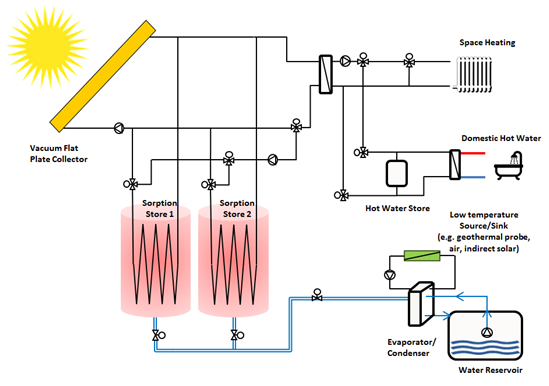WP3-5 Development of a solar seasonal storage concept based on closed sorption
WP3-5 Experimental investigation of evaporation for sorption applications
Hosted by: | AEE INTEC |
|---|---|
| Student: | Bao Nam Dang |
| Started: | 11/03/2015 |
| Supervisor(s): |
|
Project background
Efficient solar heating storages are one of the key technologies for efficient heat supply systems. Until now mainly large water storages are used in solar thermal heating systems, which have the drawback that water possesses a relatively low energy density (~ 60 kWh/m³) thus large storage volumes are needed to cover a high amount of the heat demand for domestic hot water and space heating. An innovative concept – the solid sorption heat storage – uses the reversible adsorption/desorption process of water vapor in zeolites. On the one hand, this material pair provides a distinctly higher energy density (~ 180 kWh/m³) compared to that of water, and on the other hand it provides loss-free energy storage over months. Recently a seasonal thermal storage system for a single family house was built in the laboratory at AEE INTEC and was successfully demonstrated over the period of October 2015 to January 2016 with a solar fraction of 83.5 % (see Figure 1)

To enhance the performance of the whole system, further development of the storage material and the single components are necessary. One of the issues is the evaporation of water at low pressure during the adsorption process. The current lack of accurate experimental data makes the design of the evaporator difficult and leads to deterioration of the whole storage performance.
In this Ph.D. work the main objective is to extend and deepen the knowledge of the evaporation of water at low pressure with which compact and efficient evaporators can be designed better. Therefore a test rig is currently built up for experimental investigations. First, experiments will be performed to describe the boiling behavior and mechanisms (natural convection and nucleate boiling). In these experiments simple surfaces will be partly or completely immersed into the liquid pool and be electrically heated to determine the boiling curves. The results will show, which mechanisms and corresponding heat exchangers are capable and efficient for the evaporation. In addition the influence of several parameters (liquid level, saturation pressure etc.) on the heat transfer will be quantified. In the final step experiments are performed with pool boiling and falling film configuration and heat exchangers at various operational and geometrical parameter settings. These heat exchangers are designed and optimized based on the knowledge of the first experiments.
This Ph.D. work is thematically embedded in the framework of an international research project and therefore gives a good opportunity to work in close contact to international research institutes and leading industry partners. Not only thermal storage applications will benefit from the gained knowledge on evaporators at low pressures, but also other sorption applications, like cooling and heat pumps.
